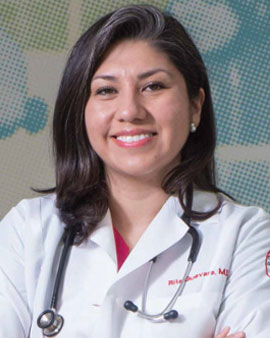
How long have you worked at Drexel? How would you describe your experience here so far?
I’ve been a part of the faculty since 2016, but only recently became the Assistant Dean of Inclusive Excellence in August 2020. As a College of Medicine alum, I have always enjoyed the collegial environment and sense of community at Drexel, and feel fortunate to now be able to give back as a faculty member and support current students.
You came to the U.S. from Peru as a child. How did that experience shape your life, and your work as a physician? On a more general note, what are some of your favorite things about being Peruvian American?
Being an immigrant has immensely shaped my life and current work. I’ve seen first-hand through my family how language barriers, health insurance and immigration policies directly and indirectly affect access to equitable health care. This is why many of my current interests are in language access and health equity.
Peruvian culture is a wonderful mix of Indigenous, African, European and Asian ancestries and cultures, which helped me to more easily see, and start to understand intersectionality and diversity within my own nationality and others. Also, the food is some of the best in the world, so I am often recommending local Peruvian restaurants to others.
Can you tell me a bit about yourself before you came to Drexel? How did you become interested in medicine, and what did your path to the Drexel Pathway to Medical School (DPMS) Program look like?
I’ve always been interested in medicine, mainly because my family placed so much value in our health growing up. After college, I took time to work with the Latinx community in Baltimore through a community afterschool program and non-profit. I also volunteered with pediatric oncology patients through Child Life to increase my clinical exposure. I strengthened my graduate science foundation through a Master in Health Sciences and later through Drexel Pathway to Medical School.
As a prospective student, what drew you to Drexel Pathway to Medical School?
It was an opportunity to demonstrate my academic abilities with mutual support from fellow underrepresented students with similar backgrounds to mine.
What was your experience as a Drexel Pathway to Medical School student like? How did it prepare you for further medical education?
Drexel Pathway to Medical School was the hardest year of my education and training thus far because of the stress of the “make or break” opportunity the program affords. I was incredibly fortunate to meet fellow students who have become lifelong friends and colleagues as we continue to support and mentor each other.
The rigorous nature of the program absolutely prepared me for the medical school curriculum and taught me how to effectively utilize group study and manage stress. My fellow Drexel Pathway to Medical School students were integral in my medical education and exposure to different cultures and experiences, highlighting areas for structural change and improvement in medicine and underrepresentation in health care.
How have your experiences as a Drexel Pathway to Medical School student shaped the work you've done to help develop the program as an alum, if at all?
My work with Drexel Pathway to Medical School has come full-circle. As an alum of the program, I am now reaching back to support current Drexel Pathway to Medical School students through my new role in the Office of Community Health and Inclusive Excellence. Drexel Pathway to Medical School underwent a curriculum revamp a few years ago, so in many aspects I’m getting to know the program in its updated form. My current work is in establishing a formal mentorship program between Drexel Pathway to Medical School students and faculty who are either underrepresented in medicine themselves or are allies.
Is there anything people don't know about Drexel Pathway to Medical School that you wish they did?
Drexel Pathway to Medical School provides an opportunity for talented and hardworking students from many different backgrounds to demonstrate their abilities in graduate-level science courses and their passion for medicine in a way they may not have been able to previously. It’s a chance for students to translate their skills and credentials thus far to reflect traditional criteria for medical school admission.
What does it mean to you to be named one of Al Día's Top Doctors for 2021, to be recognized for your work to help enhance health equity?
I am so humbled to be named among this group of physicians working toward health equity for our community. It’s so wonderful to learn more about their work and how we can further support each other through mentorship and collaboration.
What advice would you give to students who want to pursue medicine but who are part of communities that are underrepresented in the field?
We need you in medicine! We need your unique experiences and perspectives to advocate for patients and families, and further educate and train others in the medical community on culturally effective health care. Continue to work hard, network and seek opportunities for mentorship to support you along the way.